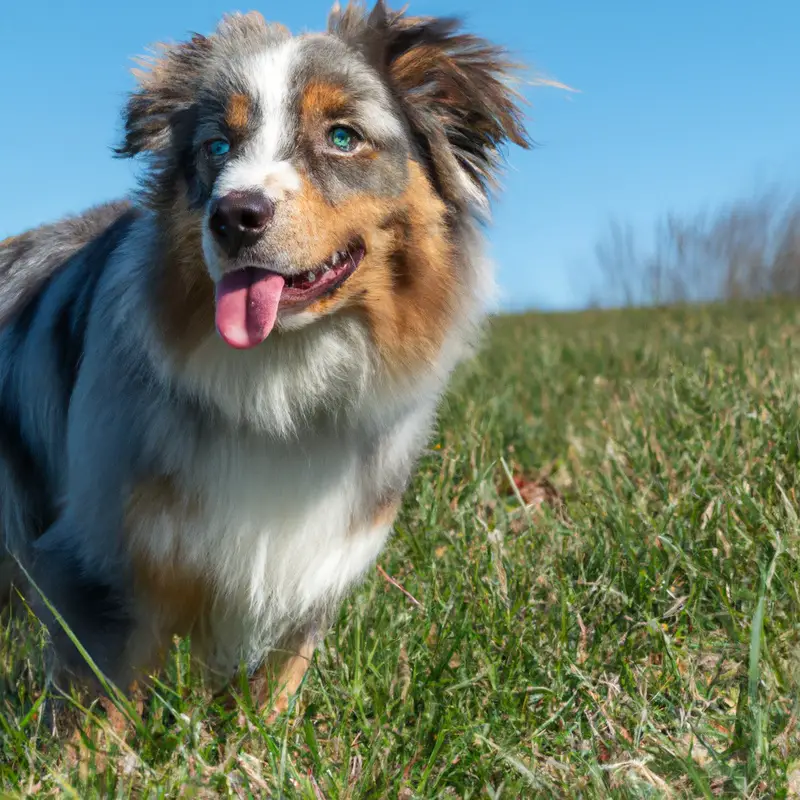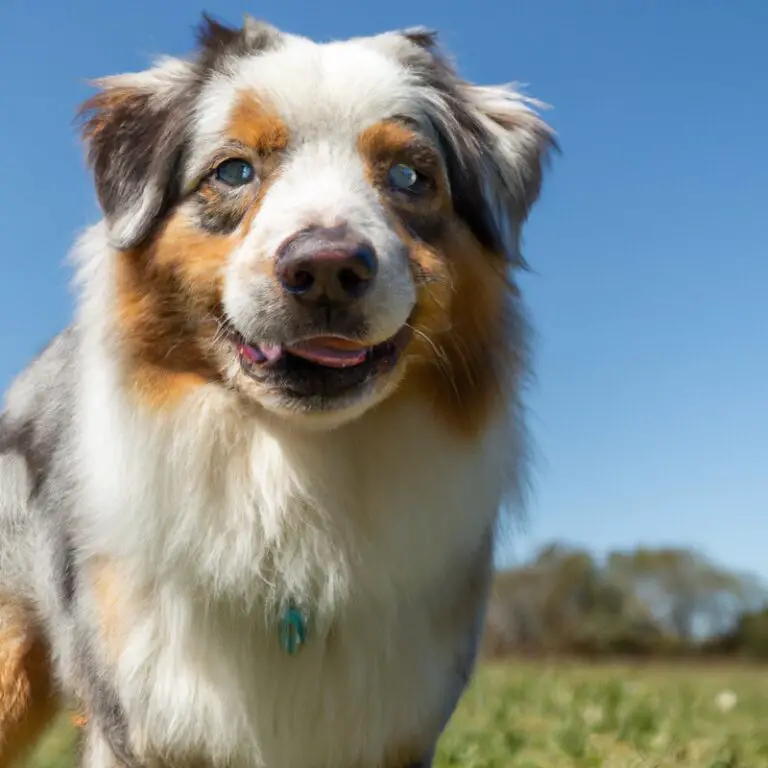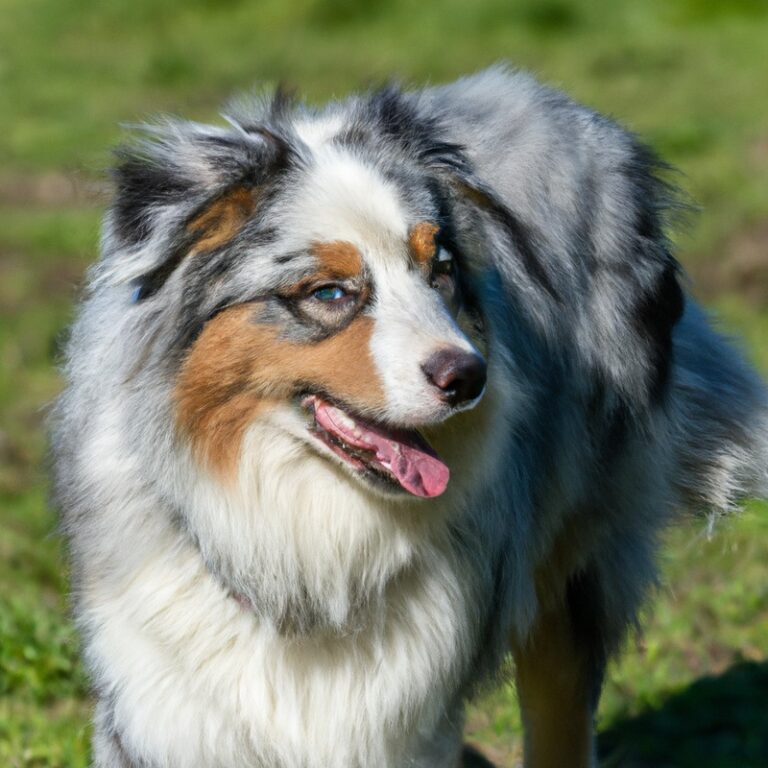How Do Australian Shepherds Behave Around Strangers?
Key Takeaways:
- Australian Shepherds are generally reserved and cautious around strangers.
- They may exhibit protective or aloof behavior when encountering unfamiliar people.
- Proper socialization and training from an early age can help ensure positive interactions with strangers.
- Australian Shepherds may vary in their behavior towards strangers, with some being more outgoing and friendly, while others remain more reserved.
Imagine this: you’re out for a walk with your Australian Shepherd, enjoying the fresh air and stunning scenery. Suddenly, a stranger appears on the horizon.
What happens next?
Are they cool and collected, or do they become nervous and skittish? As an expert in canine behavior, I’m here to shed some light on how Australian Shepherds behave around strangers.
These clever and charismatic pups have a reputation for being affectionate and loyal, but their reactions to unfamiliar faces can vary.
In this article, we’ll dive into the origins and characteristics of Australian Shepherds, explore their temperament, discuss the impact of their natural herding instincts, and provide tips on training and managing their behavior around strangers. S
| Behavior | Description |
| 1. Alert | Australian Shepherds are extremely alert and will often stay on high alert when they are around strangers. They will closely watch strangers and assess their behavior before fully accepting them. |
| 2. Reserved | Australian Shepherds can be reserved or cautious around strangers, especially if they have not been properly socialized. They may initially keep their distance and observe before approaching or interacting. |
| 3. Protective | These dogs have a protective nature, which means they may be wary of strangers approaching their family or territory. They may bark to alert their owners and will not hesitate to protect their loved ones if they sense any danger. |
| 4. Friendly | With proper socialization, Australian Shepherds can be friendly and welcoming to strangers. They can warm up quickly and show their playful and affectionate side. |
| 5. Aggressive | Although rare, some Australian Shepherds may display aggression towards strangers if they feel threatened or if they have had negative experiences in the past. It is essential to address any aggressive behavior through proper training and socialization. |
Understanding the Australian Shepherd Breed
Origins and Characteristics of Australian Shepherds
Australian Shepherds were not actually bred in Australia, despite their name. They are believed to have originated in the United States during the 19th century, specifically in the western region.
Their ancestors include various herding breeds from Europe, such as the Border Collie and the Collie.
When it comes to their physical characteristics, Australian Shepherds are medium-sized dogs with a muscular build. They have a double coat, which helps protect them from harsh weather conditions.
The coat can come in various colors, including black, blue merle, red merle, and red.
One distinctive feature is their striking “marbled” eyes, which can be blue, amber, or brown. In terms of their personality and temperament, Australian Shepherds are known for being intelligent, energetic, and highly trainable.
They have a strong herding instinct and are natural workers.
They are often described as loyal and loving companions who form strong bonds with their families. Australian Shepherds thrive in an active environment and require plenty of exercise and mental stimulation.
They enjoy participating in various activities, such as agility training, obedience trials, and herding events.
With proper training and socialization, they can get along well with children, other pets, and strangers. It’s important to note that Australian Shepherds may have a strong protective instinct, which can make them wary or reserved around strangers.
However, with early and ongoing socialization, they can learn to be more accepting of unfamiliar people.

Temperament and Personality Traits
When it comes to the temperament and personality traits of Australian Shepherds, there are a few key characteristics to keep in mind. These dogs are known for being highly intelligent, active, and outgoing.
They are often described as being affectionate, loyal, and eager to please their owners.
Australian Shepherds have a strong herding instinct, which can sometimes lead to them being cautious or reserved around strangers. However, with proper socialization and training, they can learn to be friendly and well-behaved in all situations.
It’s important to note that individual personalities can vary, so some Australian Shepherds may be more outgoing and accepting of strangers, while others may be more reserved.
Understanding and respecting their innate herding instincts is crucial for managing their behavior around strangers.
Australian Shepherds and Socialization
Importance of Socialization for Australian Shepherds
Socialization is incredibly important for Australian Shepherds. It helps them develop into well-rounded, confident, and friendly dogs.
When properly socialized, Australian Shepherds are more likely to interact positively with strangers, other animals, and different environments.
By exposing them to a variety of people, animals, and situations from a young age, you are teaching them how to navigate the world around them. This exposure allows them to become comfortable and adaptable in different situations, reducing the chances of fear or aggression towards strangers.
Socialization also helps build their confidence and reduces anxiety.
It teaches them how to respond appropriately to different stimuli, reducing the likelihood of excessive barking, chasing, or other unwanted behaviors. Effective socialization should include positive experiences with people of all ages, other animals, and various environments.
Consider enrolling your Australian Shepherd in puppy classes, taking them on walks in different neighborhoods, and introducing them to new experiences gradually.
Remember, the key to successful socialization is to make it a positive and enjoyable experience for your Australian Shepherd. Reinforce good behavior with treats, praise, and lots of love.
Proper socialization is an ongoing process.
It’s important to continue exposing your Australian Shepherd to new people, animals, and environments throughout their life. The more they are exposed to, the more confident and well-adjusted they will become.
How to Socialize Australian Shepherds
When it comes to socializing Australian Shepherds, early exposure and ongoing socialization are key. Here’s how you can help your Australian Shepherd become well-adjusted and comfortable around people and other animals:
- Start Early: Begin socializing your Australian Shepherd puppy as soon as possible. Expose them to different environments, people, and animals to help them develop confidence and prevent fear or aggression later on.
- Positive Experiences: Make sure your Australian Shepherd has positive experiences during socialization. Reward them with treats, praise, and playtime when they interact calmly and positively with new people and animals.
- Gradual Exposure: Introduce your Australian Shepherd to new experiences gradually. Start with low-stress environments and gradually increase the level of challenge. This will help them build confidence and reduce anxiety.
- Puppy Classes: Enroll your Australian Shepherd in puppy socialization classes. These classes provide controlled environments for puppies to interact and learn appropriate social behaviors under the supervision of a professional trainer.
- Consistency: Be consistent in your socialization efforts. Regularly expose your Australian Shepherd to new people, places, and situations throughout their life to reinforce positive associations and prevent fear or reactivity.
- Gentle Handling: Ensure that your Australian Shepherd is gently handled during socialization experiences. Avoid overwhelming or forcing them into situations that make them uncomfortable, as this can create negative associations.
- Supervision: Always supervise your Australian Shepherd during socialization experiences to ensure their safety and intervene if necessary. Be attentive to signs of stress or discomfort and provide them with a safe space when needed.
Remember, every Australian Shepherd is unique, so be patient and adaptable to their individual needs. With proper socialization, your Australian Shepherd can grow up to be a well-rounded and friendly companion.

Common Challenges in Socializing Australian Shepherds
Socializing Australian Shepherds can come with its share of challenges. Here are some common ones:
- Shyness and Fearfulness: Some Australian Shepherds may be naturally shy or fearful, which can make socialization difficult. They may be hesitant to approach new people or environments, requiring gentle and patient exposure.
- Overprotectiveness: Australian Shepherds have a strong protective instinct, which can manifest as aggression or territoriality towards strangers. This behavior needs to be carefully managed through positive reinforcement training and gradual exposure.
- High Energy Levels: Australian Shepherds are known for their high energy levels, which can make socialization challenging. They may become overly excited or even anxious in new situations, making it important to provide proper outlets for exercise and mental stimulation.
- Herding Behavior: Due to their herding heritage, Australian Shepherds may display tendencies to nip or chase at moving objects, including people. This behavior needs to be redirected and discouraged through proper training and socialization.
To overcome these challenges, it is important to start socializing Australian Shepherds from a young age and expose them to various people, animals, and environments. Positive reinforcement training techniques, such as rewards and praise, can help build their confidence and teach them appropriate social behavior.
Additionally, creating a safe and controlled environment at home can help manage any overprotectiveness or territorial behavior.
Providing regular exercise and mental stimulation is crucial for channeling their energy in a positive way. If you are facing significant difficulties in socializing your Australian Shepherd, it may be beneficial to seek professional help from a certified dog trainer or behaviorist.
They can provide personalized guidance and develop a training plan to address any specific challenges you may be facing.

Australian Shepherds’ Behavior Towards Strangers
Natural Herding Instincts and Its Impact
Australian Shepherds have a strong natural herding instinct, which is deeply ingrained in their breed. This instinct is a result of their ancestry as working dogs on farms and ranches.
Their herding instincts drive them to round up and control livestock, and they may exhibit similar behaviors towards humans or other animals.
The impact of this herding instinct on Australian Shepherds’ behavior towards strangers can vary. Some Australian Shepherds may display cautious behavior when encountering strangers.
They may bark, retreat, or try to gather and control the strangers by gently nipping at their heels.
On the other hand, some Australian Shepherds may be more social and friendly towards strangers, especially if they have been properly socialized from a young age. However, their herding instincts may still manifest in behaviors such as circling or ‘herding’ people to keep them together.
It is important for Australian Shepherd owners to understand this natural herding instinct and its impact on their dog’s behavior.
This can help them manage and train their dogs appropriately around strangers. Factors such as genetics, individual temperament, and early socialization experiences can influence how intensely an Australian Shepherd displays their herding instincts towards strangers.
It’s important to note that not all Australian Shepherds will have the same behavior towards strangers, and some may exhibit more herding behaviors than others.
Variations in Australian Shepherds’ Attitudes Towards Strangers
Australian Shepherds can have varying attitudes towards strangers, just like any other breed. While some Australian Shepherds may be friendly and welcoming towards strangers, others may be more reserved or even aloof.
It’s important to note that individual temperament and personality play a significant role in these variations.
Some Australian Shepherds are naturally more social and outgoing, while others are inherently cautious and prefer to keep their distance. Additionally, early socialization and training can also influence a dog’s behavior towards strangers.
Every Australian Shepherd is unique, so it’s essential to understand and respect their individual attitudes towards strangers.
Factors Affecting Australian Shepherds’ Behavior Towards Strangers
Several factors can influence Australian Shepherds’ behavior towards strangers. One important factor is their early socialization experiences.
If a dog has had positive interactions with strangers during their critical socialization period, they are more likely to be comfortable and friendly towards unfamiliar people.
On the other hand, if they have had limited or negative experiences, they may exhibit fear or aggression towards strangers. Another factor is the dog’s individual temperament and personality.
While Australian Shepherds tend to be intelligent, loyal, and protective, some individuals may be naturally more aloof or wary of strangers.
This can be influenced by genetics, early experiences, and the overall socialization they have received. The role of the dog’s owner or guardian is also crucial in affecting their behavior towards strangers.
If the owner provides consistent training, positive reinforcement, and guidance, the Australian Shepherd is more likely to develop positive associations with strangers.
Conversely, if the owner lacks leadership or fails to address any signs of fear or aggression, the dog’s behavior towards strangers may be problematic. Lastly, the environment in which the Australian Shepherd lives can impact their behavior towards strangers.
If they have been exposed to various environments, people, and situations from an early age, they are more likely to feel comfortable and confident in new social settings.
However, a lack of exposure or a restrictive environment can contribute to fear or anxiety towards strangers. These factors interact and can vary from dog to dog.
While some Australian Shepherds may naturally be more accepting of strangers, others may require specific training and socialization efforts to feel comfortable around unfamiliar people.
Understanding these factors can help owners navigate their Australian Shepherd’s behavior towards strangers more effectively.
Training Australian Shepherds’ Stranger Reactivity
Positive Reinforcement Training Techniques
Positive reinforcement training techniques are a great way to train Australian Shepherds and modify their behavior around strangers. Here are some effective methods:
- Rewards: Use treats, praise, or toys as rewards to reinforce good behavior. When your Australian Shepherd behaves calmly or positively around strangers, give them a reward immediately.
- Clicker training: Clicker training involves using a small device that makes a clicking sound to mark desired behavior. Pair the click with a reward to let your dog know they did something right.
- Desensitization: Gradually expose your Australian Shepherd to strangers in a controlled and positive environment. Start with low-stress situations and gradually increase the level of exposure over time.
- Counterconditioning: Pair the presence of strangers with something positive, like treats or playtime, to create positive associations. This helps your dog associate the presence of strangers with enjoyable experiences.
- Basic obedience training: Teach your Australian Shepherd basic obedience commands, such as “sit” and “stay.” These commands can be useful in redirecting their attention and maintaining control in social situations.
- Consistency and patience: Training takes time, so be patient and consistent with your techniques. Consistently reward good behavior and avoid punishments or harsh methods, as they can create fear or aggression.
- Seeking professional help: If your Australian Shepherd’s stranger reactivity is severe or challenging to manage, consider consulting a professional dog trainer or behaviorist. They can provide personalized guidance and support for you and your dog.
Remember to always approach training with a positive mindset and a willingness to adapt your techniques based on your dog’s individual needs. With time, patience, and the right training techniques, you can help your Australian Shepherd become more comfortable around strangers.
Counterconditioning and Desensitization Exercises
Counterconditioning and desensitization exercises are effective techniques for managing Australian Shepherds’ stranger reactivity. These exercises involve gradually exposing the dog to strangers in a controlled and positive manner, helping them change their emotional response from fear or anxiety to a more relaxed and positive one.
Counterconditioning involves pairing the presence of strangers with something the dog finds enjoyable, such as treats or playtime.
This helps the dog associate strangers with positive experiences, gradually reducing their fear or reactivity. It’s important to start with low-intensity situations and gradually increase the difficulty as the dog becomes more comfortable.
Desensitization involves gradually exposing the dog to strangers at a distance that doesn’t trigger fear or reactivity.
Over time, the distance is gradually decreased, and the dog learns to associate strangers with calmness and relaxation. Patience and consistency are key when practicing desensitization exercises.
It’s crucial to consult with a professional dog trainer or behaviorist experienced in positive reinforcement training methods to ensure the exercises are conducted safely and effectively.
They can provide guidance on creating a customized training plan and offer support throughout the process. Remember, each dog is unique, and progress may vary.
It’s important to be patient and go at the dog’s pace, always prioritizing their comfort and well-being.
With time, consistent practice, and positive reinforcement, Australian Shepherds can learn to be more relaxed and comfortable around strangers.
Seeking Professional Help for Severe Cases
If you find yourself dealing with severe cases of stranger reactivity in your Australian Shepherd, seeking professional help is highly recommended. Professional dog trainers or behaviorists have the expertise and experience to assess the specific needs of your dog and provide targeted training techniques.
They can help you develop a tailored behavior modification plan to address your Australian Shepherd’s reactivity and reduce their fear or aggression towards strangers.
Working with a professional will ensure that you receive guidance and support throughout the training process and increase the chances of a positive outcome for both you and your dog. So, if you’re facing severe cases of stranger reactivity, don’t hesitate to reach out to a professional for assistance.
Tips for Managing Australian Shepherds Around Strangers
Early Exposure and Ongoing Socialization
Early exposure and ongoing socialization are essential for Australian Shepherds to develop positive behaviors around strangers. By introducing your Aussie to various people, places, and experiences from an early age, you can help them become confident and well-adjusted dogs.
Regularly exposing your Aussie to new situations and individuals throughout their life will reinforce their social skills and prevent them from developing fear or aggression towards strangers.
It’s important to provide positive and controlled interactions with different people so they can learn how to behave appropriately in social settings. Regular outings and supervised playdates can also contribute to their socialization and help them become comfortable with strangers.
Providing a Safe Space at Home
To provide a safe space for your Australian Shepherd at home, there are a few things you can do. First, make sure your home environment is free from potential dangers such as toxic plants, exposed electrical cords, or hazardous objects.
Keep cleaning supplies and medications securely stored out of reach.
Second, create a designated area or crate where your Australian Shepherd can retreat to if they feel anxious or overwhelmed. This space should be comfortable, quiet, and away from high traffic areas.
Provide cozy bedding and some familiar toys to help them feel secure.
Third, establish a consistent routine and set boundaries for your Australian Shepherd. This will help them feel more settled and confident in their environment.
Make sure they have access to regular exercise and mental stimulation to prevent boredom and excess energy.
Remember to always supervise your Australian Shepherd around strangers and gradually introduce them to new people in a controlled and positive manner. With patience and proper care, you can create a safe and happy home environment for your Australian Shepherd.
The Role of Proper Exercise and Mental Stimulation
Proper exercise and mental stimulation play a vital role in managing Australian Shepherds’ behavior around strangers. Regular physical activity helps release excess energy and prevent boredom, which can contribute to behavioral issues.
Engaging their minds with interactive toys, puzzles, and training sessions helps keep them mentally stimulated.
This is especially important for Australian Shepherds, as they are intelligent and active dogs. Incorporating regular exercise and mental challenges into their routine can help them stay calm and focused when encountering strangers.
It’s crucial to find a balance and provide them with a variety of activities to keep them engaged and content.
Final Verdict
Australian Shepherds can exhibit a range of behaviors towards strangers, influenced by their herding instincts and individual personalities. Proper socialization is crucial for shaping their interactions with unfamiliar people.
Positive reinforcement training techniques, counterconditioning, and desensitization exercises can be effective in managing and reducing stranger reactivity.
Early exposure, ongoing socialization, and providing a safe space at home are key in managing their behavior. Regular exercise and mental stimulation also play a vital role in maintaining their overall well-being.
Remember, each Australian Shepherd is unique, so patience, consistency, and professional guidance may be necessary for addressing severe cases.
Overall, understanding their breed characteristics and offering the right approach can create a positive experience for both Australian Shepherds and strangers alike.







